- Home
- Joseph Bruchac
Dragon Castle Page 4
Dragon Castle Read online
Page 4
“Ano,” the boy agreed. There was no hesitation. The man who called himself Uncle Tomas marked that and nodded.
“First, you must always listen.”
“I will always listen.”
His small voice was as solemn as that of a knight taking an oath on his sword.
“Second, you must never again speak the name you were given by your family. There are other ears that might hear it. From now on, you will have another name. From now on you will be Pavol.”
“Pavol,” the boy said.
CHAPTER FOUR
Lowered Defenses
“By THE HEAD of the dragon!” someone next to me whispers in an awed voice.
I look over to my left. Zelezo, our castle blacksmith has come up to join me in the battlement. In fact, nearly all of the others who reside in Hladka Hvorka have climbed the steep stone stairs up to the forward rampart to peer down at the wellweaponed force glaring up at us. Cook is there as well as Jazda, our groom, and his twelve-year-old son, Hreben, the stable boy. Our four maids, Grace, Grace, Grace, and Charity. Janko and Juraj, our two serving boys. Georgi and myself. Twelve of us in all. The only others not in sight are Brana and Dvihatch, our two elderly gatemen—who have remained at their posts in the barbican—and Black Yanosh.
I’m not surprised that he is missing. Nor do I think for a minute that he is unaware of the threat outside our walls. It is Black Yanosh’s way to make himself scarce at times such as this. Watch and wait, see the weakness of any opponent before showing your hand.
Thinking of hands, aside from myself and burly Zelezo, who’s holding his hammer, the hands of the rest of us are empty. We are most certainly not an army.
Nothing unusual about that. Like all of the generations of Hladka Hvorka since Pavol the Good, my parents have never seen the need for any sort of army. Their only wish, an innocent one, has been to rule well and be left alone. Our lands are not on any main route to anywhere. The road that leads up here ends at our castle after passing through the one gap in the High Tatra Mountains that circle us like the embrace of stone arms. Thus there’s been no history of armies marching back and forth through here on their way to conquering someplace else. No one in any of the twelve surrounding kingdoms and baronies has ever shown any interest in our lands, which are fertile enough to support our people, but produce nothing of any greater worth than wheat, vegetables, a few cattle, and the honey that is our valley’s one export and the only thing that seems to draw outsiders up here. Our family has inherited wealth enough to support us and help those in need, but we have never shown ourselves to have the sort of riches that would inspire greed.
There are certain wild rumors that Hladka Hvorka hides some sort of great secret, hidden here since the time of Pavol the Good. But the thought of making such a long journey and then having to confront my mother and father has always discouraged fortune seekers. For some reason, despite my parents’ openness, good nature, and generosity, people often appear to be a bit awed by my mother and father.
It is not just that my parents are both direct descendants of a man who defeated a dragon or that my mother is reputed to have magical powers and a touch of Faerie blood. There are also some rather fantastic stories of things they supposedly have done. All of which happened before Paulek and I were born. None of which I quite believe.
Can you imagine my gentle mother calling down lightning to strike a water demon that had taken up residence in the swamp of Bahno Diera, where it was luring people to the edge of the water to drown them? Or my father wrestling an ogre that had been stealing sheep? My father is strong, I admit. But it is difficult for me to believe that he lifted such a creature over his head, walked to the edge of a cliff, and then asked (in a reasonable voice) if it would prefer to descend into that valley which led to the pass out of our land on its own feet never to return again or take a, one might say, faster route. Purportedly, that ogre indicated in a carefully polite voice that walking was its preference.
However, though such legends of my parents’ prowess are probably exaggerated, Father and Mother have shown themselves now and then to be, in an absentminded way, rather formidable.
As are the moat and the thick walls of Hladka Hvorka. It would take a far larger force than the one I see below us and extremely sophisticated siege engines to breech our defenses. Although most of those within our walls are not trained warriors, everyone has been taught what to do if the time might come when we would need to defend ourselves here.
Unlike most castles, there are no structures made only of wood within the smooth, doubly thick walls of Hladka Hvorka. Visitors frequently comment that our castle seems to not have been built but to have grown out of the living stone of the hill itself. It’s a comment that I always find amusing. I am sure there is a reasonable explanation for the organic appearance of our home. Perhaps some technique of making a stone-like substance that can be poured and shaped—some process forgotten with the passage of years. In any event, fire arrows can do little damage.
I mentally tally our assets. We have two wells of clear, sweet water inside the castle. There are enough stores of food and firewood to allow us to remain inside here for months and outlast any invaders. The moat is wide and deep. The parapets of the castle have been well made, with embrasures to shelter defenders from the arrows of any attackers. And we have bows and arrows in our armory that could be fired down through the arrow slits in the embrasures. A few of us know how to use them to deadly and discouraging effect. Especially my brother and I. But thinking of Paulek, where is he now? He’s not on the battlements with the rest of us.
No matter. We’ll be fine for now as long as we do not...
“Lower the drawbridge,” a clear, friendly voice calls from the main courtyard below.
I spin around to look. It’s Paulek, of course. While I was lost in thought, he went down to the gatehouse.
I descend the stairs as fast as I can.
“Zastav!” I shout. “Stop!”
My voice goes unheard over the rattle of the great chains, the screeching of metal as the portcullis is raised, followed by the earth-shaking ka-whomp of the great iron-bound planks of the bridge as they thud down onto the other side.
Too late. But even if I’d called out louder, would I have been obeyed? I’m the younger brother. With our parents gone—and what a time for them to be missing!—he’s in charge. And if Paulek makes his mind up to do something, I cannot just tell him no. With a little time, I can manage to convince him to do what is best. But there is no time for that now. The entire mounted host, led by their two bulky flag bearers, comes clomping over the bridge and into the main courtyard in the heart of Hladka Hvorka. All I can do now is step aside. As he passes me, the helmeted flag bearer on the right turns his head to leer down at me. Part of what looks like a long scar on his cheek is just visible through the helmet.
“Dobry’ den, pan,” he growls. “Good day, sir.” His guttural voice is as thick with sarcasm as it is with some sort of accent. Austrian, perhaps. Many of that nation are mercenaries.
Then he spits at my feet. I let it spatter on my right boot, not giving him the satisfaction of stepping back. I hold his gaze until he is so far past me that he needs to turn his head or lose his balance.
This is not good.
I look around for Paulek. I’m not quite certain what I am going to say to him. I’m angry and worried at the same time. Now that these armed men are inside, our defenses down, they may attack us at any time. I feel the weight of the sword at my side. Perhaps we might still stand a chance if we take action quickly enough. I can sense Black Yanosh somewhere nearby. I picture him thoughtfully stroking his mustache as he watches.
We are here.
The voices of Ucta and Odvaha are close, no longer in the woods below the castle. Unseen and cautious, they’ve followed the soldiers and are just outside the gate, waiting for my call. But I can do nothing until I find my brother.
“Vitajte kamarati,” a welcoming voice shouts. Pau
lek’s voice.
He’s standing halfway up the steps where he can be seen. His arms are held open. There’s a big smile on his face, probably because he is always looking for sparring partners. Lots of these men look to be formidable fighters. Plenty of new opponents for him to cross swords with in what he thinks would be comradely combat! Ha!
“Welcome, friends,” he repeats in his deep, resonant voice. “Welcome to Hladka Hvorka. I am Prince Paulek. I greet you in the name of my father and my mother, who are both, er, away at the moment.”
It’s a properly princely greeting. Paulek both sounds and looks regal as he poses there. With his best gold-embroidered cloak over his broad shoulders, he is impressive indeed. His height, his muscular arms and legs and broad chest make him even more impressive. His handsome features are not at all diminished by the hook nose that has characterized every male in our family since Duke Pavol the First.
Now, if only he could think as well as he looks.
The lanky herald dismounts, struts forward to stand below Paulek, then does an extravagant bow, sweeping off his feathered cap as he does so.
“Young man,” the herald says, “we thank you for your welcome. And now it is my pleasure, my honor . . .” He pauses, then shouts his next words as if they were meant not just for our ears but for all the land around: “TO INTRODUCE HE WHO IS BELOVED BY ALL, A LION AMONG MEN, THE GREAT BARON TEMNY!”
His declamation is followed by the loud thuds of the mounted men pounding their fists against shields and striking the butts of lances against the stone of the courtyard. As one they chant their leader’s name.
“TEMNY! TEMNY! TEMNY! TEMNY!”
It’s impressive. I’ve now moved across the courtyard and mounted the steps to stand near my brother and get a better view of the ominous spectacle being acted out before us. A figure in lacquered armor on a prancing chestnut steed is crossing the drawbridge and passing through our gate. Mist—and where did that come from?—swirls around him. He’s all in red—save for his left hand, which is encased in a silver gauntlet. Because his helm is cradled under his left arm, I can see his face. It’s as disquieting as the raised sword held high aloft in his right hand. His vulpine features are narrow and the small teeth shown in his wide smile appear as sharp and pointed as those of a weasel. His close-set eyes are shaded by eyebrows that join together in the middle of his forehead and are as thick and red as the long hair that falls down to his shoulders. The look in his blue eyes, which dart constantly back and forth, is far from magnanimous and honorable. Vicious and hungry, I’d say.
From the length of his legs and the size of the horse he’s riding, he’s at least as tall as Paulek and I. Though his raised right arm seems almost skeletally thin, there’s enough strength in it for him to hold high that heavy blade without wavering.
He sweeps the sword down so that it is level before him. The shouting and thudding of fists and lances suddenly stops. The sword points, interestingly enough, at my chest. But only for a heartbeat. The baron twirls and sheathes it in a motion that is as elegant and threatening as was its previous position.
“Young princes,” he trills. His voice is higher than I’d expected, but as smooth as oil. “Dakujem. Thank you.”
He then makes a wide gesture with his right arm, as theatrical as his herald. The two of them must spend a bit of time practicing in front of mirrors. His hand ends up thrust toward the gateway, palm up, fingers extended.
“And now I introduce to you my dear and lovely daughter, unmatched in grace and beauty, the fairest of innocent flowers, the delightful Princess Poteshenie.”
I look out of the corner of my eye at Paulek. His mouth is open in eager anticipation. All his defenses are lowered.
Not good. Not good at all.
Another mounted figure appears on the other side of the moat, as if conjured up out of the curtain of mist that rose there after the baron’s entrance. The mist swirls as the white horse moves, picking its way delicately forward. Then the white cloud parts to reveal a slender figure dressed all in virginal white sitting side-saddle, a veil modestly covering her face. It’s a graceful, carefully demure entrance. But her arrival seems as foreboding to me as the baron’s. I also wonder what is moving inside the large wicker cage fastened to the back of her saddle.
The princess halts her palfrey beside the baron. She pauses, for effect. Then she languidly lifts up her hand. It’s a long, finely shaped white hand, the sort a courtier would kneel to kiss in a chivalrous saga. She pushes back her veil and lifts her chin to reveal her face. Oval, perfect, framed by long, lustrous hair that is as red as the baron’s. Even from fifty feet away I can smell her perfume. Its scent is so heady that it makes me a bit dizzy. Her pouty lips are pursed, slightly parted, moist and trembling. She lowers her chin and lifts her eyes to look up at us.
Come to me. Come to Princess Poteshenie, the princess of happiness . . .
Zobud! The breathless voices of Ucta and Odvaha speak as one. Wake up!
I blink my eyes. My vision, which had begun to blur, is clear again. I look toward the drawbridge. My wolf brothers are there, sitting up on their haunches, alert and ready.
Dakujem, I think to them. Thank you.
I turn my gaze back to Poteshenie. For the briefest moment it seems as if the princess herself becomes indistinct. It’s as if the air moves and reshapes itself around her. Something trembles there, like those nearly invisible strands of spider’s web that sometimes catch across one’s face. Do her loveliness and youth seem to fade? The moment passes too quickly for me to tell. I blink my eyes and she is just as she was before. Exquisitely beautiful, perfect . . . too perfect.
I no longer feel drawn to her. From the subtle displeasure in her eyes and the way she presses her lips together, she knows she’s lost me. Her look hardens even more as she turns back to look over her shoulder at my two four-legged friends. She knows it was their voiceless call that snapped me out of her spell. I’ll not be caught by her again. Attractive as she may appear on the outside, I see that what’s within this princess is not at all lovely. She’s as alluring as a plum with a worm in its heart. I no longer find her attractive at all.
But not Paulek. His mouth is wide open now. His eyes are glazed.
“P-P-Princess,” he stammers. Then he descends the steps like a sleepwalker, kneels before her, reaches up and takes that perfect hand to kiss it.
Everyone is looking at the two of them.
Except for the baron and me. His appraising gaze is taking me in from head to toe. And I am measuring him.
His dark eyes glitter like those of a snake. I feel as if I can read his thoughts.
There’s nothing you can do to stop this, he’s thinking.
Paulek, though, is oblivious to this. He is still staring, mouth wide open, at the princess. The baron turns to look at my brother. His thin lips curl up at the edges. Again, the baron’s look is easy to read.
We have this one hooked.
The baron looks toward Georgi. Our faithful majordomo is standing with his arms at his side, his eyes subserviently focused on the ground. The baron nods his head dismissively.
A mere servant.
The baron looks at me again. My right hand taps the hilt of my sword.
He shakes his head, no longer so pleased.
The baron flexes his fingers inside the silver gauntlet wrapped around his pommel. The leather creaks in protest. Then he turns his eyes away from mine.
By the head of the dragon! We are in trouble.
Thinking of trouble, Princess Poteshenie has now dismounted from her horse. She’s fiddling with that large wicker cage on the back of her horse, lifting up the door at the front of it.
A dark-furred creature leaps out, hisses and spits at us. Then, swift as an arrow from a bow, darts off around the side of the keep.
The princess claps her hands in delight. “Oh, see how happy my sweet little innocent pussycat Laska is to be free!”
Little? If that spitting ball of malice is a ca
t, it is the largest one I’ve ever seen. It’s the size of a lynx, but with a longer tail.
Hysterical squawking erupts from behind the keep. It comes to me just where the princess’s sweet little monster was headed. Our hen yard.
I know it is rude to take off at a run just when a visitor has arrived, uninvited or not. But those chickens are the source of our breakfast eggs. However, by the time I reach the yard it’s too late for half our laying hens. Blood and feathers are everywhere. Slaughtered bodies are strewn about the straw. Their surviving sisters are perched on top of the coop, squawking in terror. In the center of the carnage, Laska squats on her haunches, contentedly chewing the head off our rooster. I slowly start to reach for the pitchfork that leans against the coop.
Before I can do anything, Princess Poteshenie’s voice comes from behind me. She’s also followed those sounds of feline-initiated slaughter—likely quite familiar to her.
“Milacik, pridi! Darling, come!”
One last bite to sever the head, which she drops by my feet in what could only be described as a contemptuous fashion. Then the purring assassin stalks past me to leap up into the protective arms of her mistress.
THE BARON IS sitting patiently on his horse. Paulek is also waiting. His eyes focus on Poteshenie as she walks past him to place Laska back into her cage and close the door. Then, as she turns, a perfumed handkerchief falls from her sleeve. It would seem like an accident if I had not seen her artfully placing that kerchief there so that it would descend at the twitch of a wrist.
Paulek almost falls over his own feet in his eagerness to leap forward and pick it up.
“P-Princess,” he says. “You dropped this.”
She lifts one hand to her mouth, purses her lips. “Oh, how gallant. Vd’aka. But you must keep it. Keep it to think of me.”
Paulek cradles the kerchief in his hands as if it were a baby. I think I am about to throw up. I almost say something, but the baron speaks first.

 Peacemaker
Peacemaker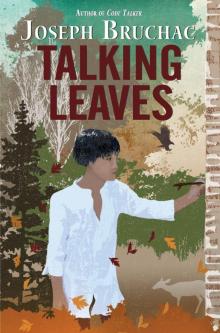 Talking Leaves
Talking Leaves Found
Found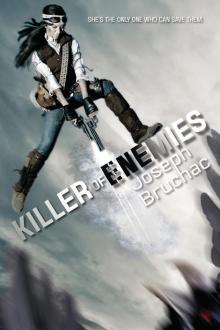 Killer of Enemies
Killer of Enemies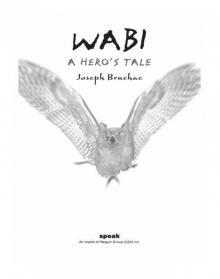 Wabi
Wabi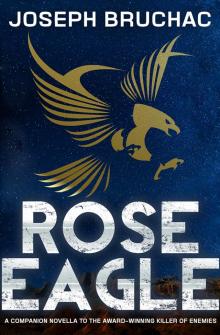 Rose Eagle
Rose Eagle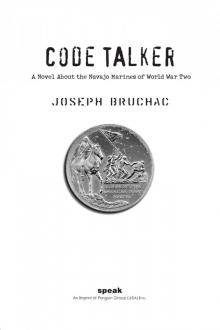 Code Talker
Code Talker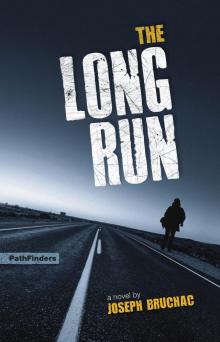 The Long Run
The Long Run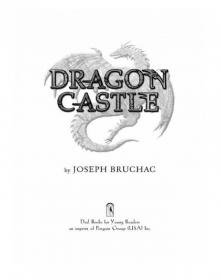 Dragon Castle
Dragon Castle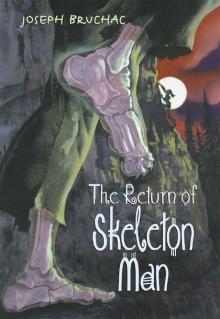 The Return of Skeleton Man
The Return of Skeleton Man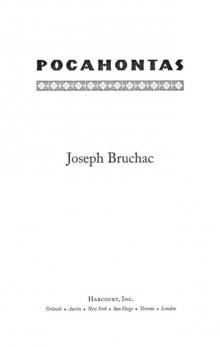 Pocahontas
Pocahontas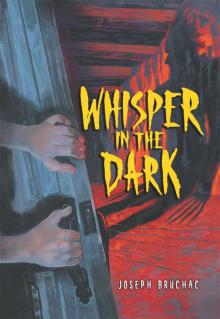 Whisper in the Dark
Whisper in the Dark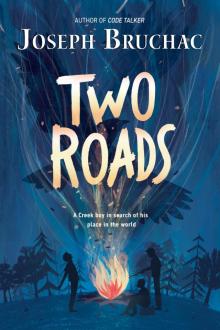 Two Roads
Two Roads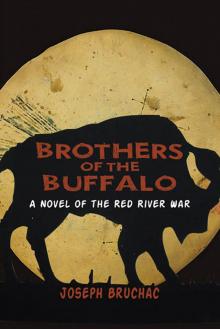 Brothers of the Buffalo
Brothers of the Buffalo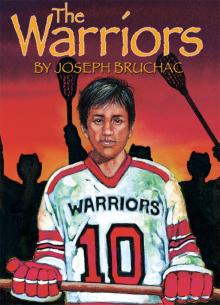 The Warriors
The Warriors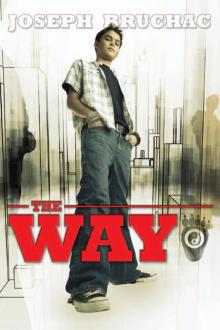 The Way
The Way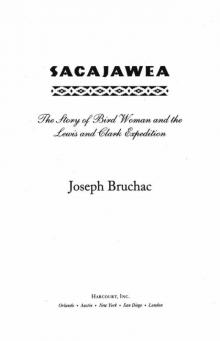 Sacajawea
Sacajawea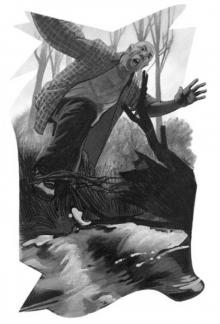 Night Wings
Night Wings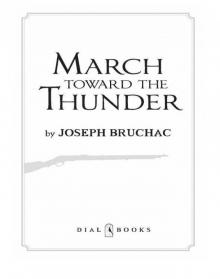 March Toward the Thunder
March Toward the Thunder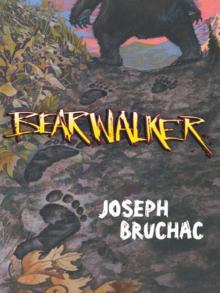 Bearwalker
Bearwalker Skeleton Man
Skeleton Man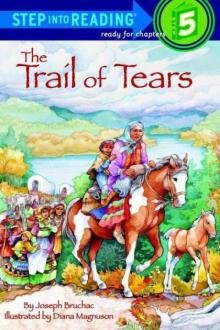 The Trail of Tears
The Trail of Tears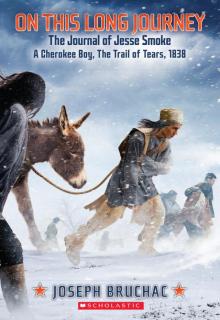 On This Long Journey
On This Long Journey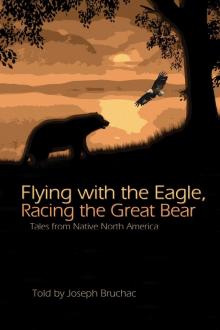 Flying with the Eagle, Racing the Great Bear
Flying with the Eagle, Racing the Great Bear